Analysis of Implied Freedom of Political Communication in Australia
VerifiedAdded on 2023/06/03
|9
|2796
|175
Homework Assignment
AI Summary
This assignment delves into the concept of implied freedom of political communication within the Australian legal framework. It addresses five distinct scenarios, each posing questions about the extent and limitations of this freedom. The analysis examines the constitutionality of government actions and legislation, considering the balance between individual rights and public interests. The assignment references key cases such as Australian Capital Television Pty Ltd v. Commonwealth, Lange v. Australian Broadcasting Corporation, and McCloy v. New South Wales, to illustrate the application of legal principles. The scenarios cover a range of issues, including religious freedom, protest rights, environmental protection, election funding, and artistic expression, providing a comprehensive exploration of the implied freedom of political communication and its implications for various aspects of Australian life. The assignment's structure includes identifying whether communication is political, and applying relevant tests to determine any breach of implied freedom.
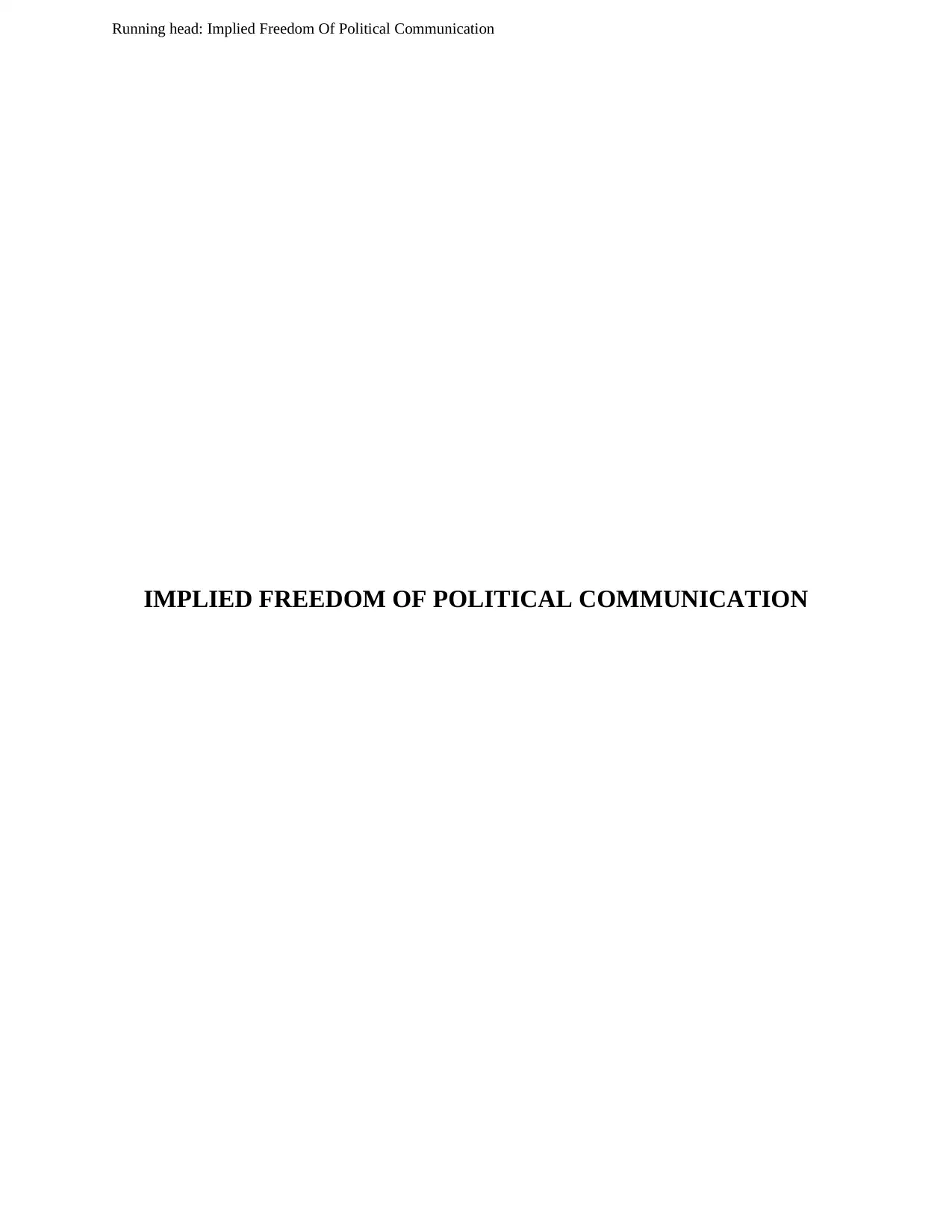
Running head: Implied Freedom Of Political Communication
IMPLIED FREEDOM OF POLITICAL COMMUNICATION
IMPLIED FREEDOM OF POLITICAL COMMUNICATION
Paraphrase This Document
Need a fresh take? Get an instant paraphrase of this document with our AI Paraphraser
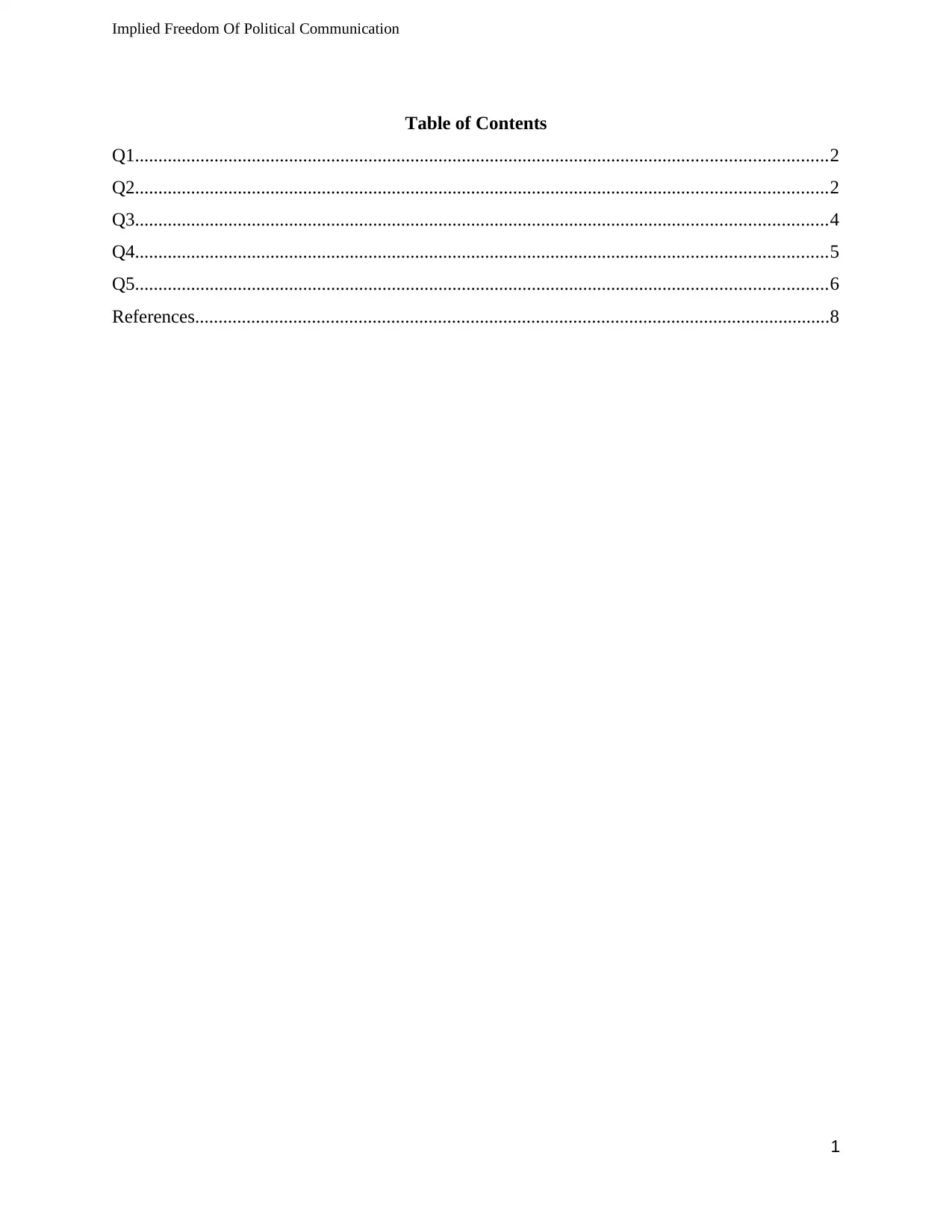
Implied Freedom Of Political Communication
Table of Contents
Q1....................................................................................................................................................2
Q2....................................................................................................................................................2
Q3....................................................................................................................................................4
Q4....................................................................................................................................................5
Q5....................................................................................................................................................6
References........................................................................................................................................8
1
Table of Contents
Q1....................................................................................................................................................2
Q2....................................................................................................................................................2
Q3....................................................................................................................................................4
Q4....................................................................................................................................................5
Q5....................................................................................................................................................6
References........................................................................................................................................8
1
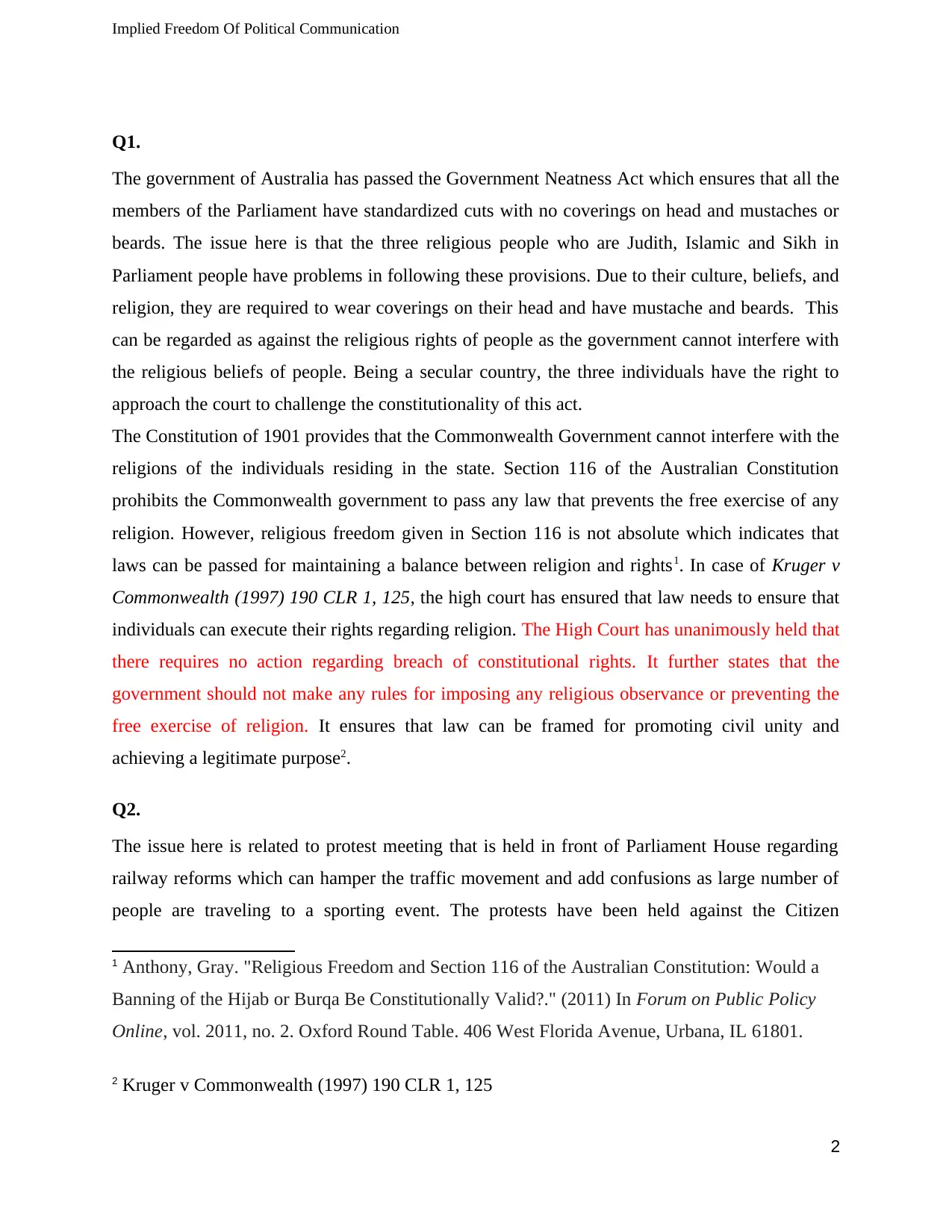
Implied Freedom Of Political Communication
Q1.
The government of Australia has passed the Government Neatness Act which ensures that all the
members of the Parliament have standardized cuts with no coverings on head and mustaches or
beards. The issue here is that the three religious people who are Judith, Islamic and Sikh in
Parliament people have problems in following these provisions. Due to their culture, beliefs, and
religion, they are required to wear coverings on their head and have mustache and beards. This
can be regarded as against the religious rights of people as the government cannot interfere with
the religious beliefs of people. Being a secular country, the three individuals have the right to
approach the court to challenge the constitutionality of this act.
The Constitution of 1901 provides that the Commonwealth Government cannot interfere with the
religions of the individuals residing in the state. Section 116 of the Australian Constitution
prohibits the Commonwealth government to pass any law that prevents the free exercise of any
religion. However, religious freedom given in Section 116 is not absolute which indicates that
laws can be passed for maintaining a balance between religion and rights1. In case of Kruger v
Commonwealth (1997) 190 CLR 1, 125, the high court has ensured that law needs to ensure that
individuals can execute their rights regarding religion. The High Court has unanimously held that
there requires no action regarding breach of constitutional rights. It further states that the
government should not make any rules for imposing any religious observance or preventing the
free exercise of religion. It ensures that law can be framed for promoting civil unity and
achieving a legitimate purpose2.
Q2.
The issue here is related to protest meeting that is held in front of Parliament House regarding
railway reforms which can hamper the traffic movement and add confusions as large number of
people are traveling to a sporting event. The protests have been held against the Citizen
1 Anthony, Gray. "Religious Freedom and Section 116 of the Australian Constitution: Would a
Banning of the Hijab or Burqa Be Constitutionally Valid?." (2011) In Forum on Public Policy
Online, vol. 2011, no. 2. Oxford Round Table. 406 West Florida Avenue, Urbana, IL 61801.
2 Kruger v Commonwealth (1997) 190 CLR 1, 125
2
Q1.
The government of Australia has passed the Government Neatness Act which ensures that all the
members of the Parliament have standardized cuts with no coverings on head and mustaches or
beards. The issue here is that the three religious people who are Judith, Islamic and Sikh in
Parliament people have problems in following these provisions. Due to their culture, beliefs, and
religion, they are required to wear coverings on their head and have mustache and beards. This
can be regarded as against the religious rights of people as the government cannot interfere with
the religious beliefs of people. Being a secular country, the three individuals have the right to
approach the court to challenge the constitutionality of this act.
The Constitution of 1901 provides that the Commonwealth Government cannot interfere with the
religions of the individuals residing in the state. Section 116 of the Australian Constitution
prohibits the Commonwealth government to pass any law that prevents the free exercise of any
religion. However, religious freedom given in Section 116 is not absolute which indicates that
laws can be passed for maintaining a balance between religion and rights1. In case of Kruger v
Commonwealth (1997) 190 CLR 1, 125, the high court has ensured that law needs to ensure that
individuals can execute their rights regarding religion. The High Court has unanimously held that
there requires no action regarding breach of constitutional rights. It further states that the
government should not make any rules for imposing any religious observance or preventing the
free exercise of religion. It ensures that law can be framed for promoting civil unity and
achieving a legitimate purpose2.
Q2.
The issue here is related to protest meeting that is held in front of Parliament House regarding
railway reforms which can hamper the traffic movement and add confusions as large number of
people are traveling to a sporting event. The protests have been held against the Citizen
1 Anthony, Gray. "Religious Freedom and Section 116 of the Australian Constitution: Would a
Banning of the Hijab or Burqa Be Constitutionally Valid?." (2011) In Forum on Public Policy
Online, vol. 2011, no. 2. Oxford Round Table. 406 West Florida Avenue, Urbana, IL 61801.
2 Kruger v Commonwealth (1997) 190 CLR 1, 125
2
⊘ This is a preview!⊘
Do you want full access?
Subscribe today to unlock all pages.

Trusted by 1+ million students worldwide
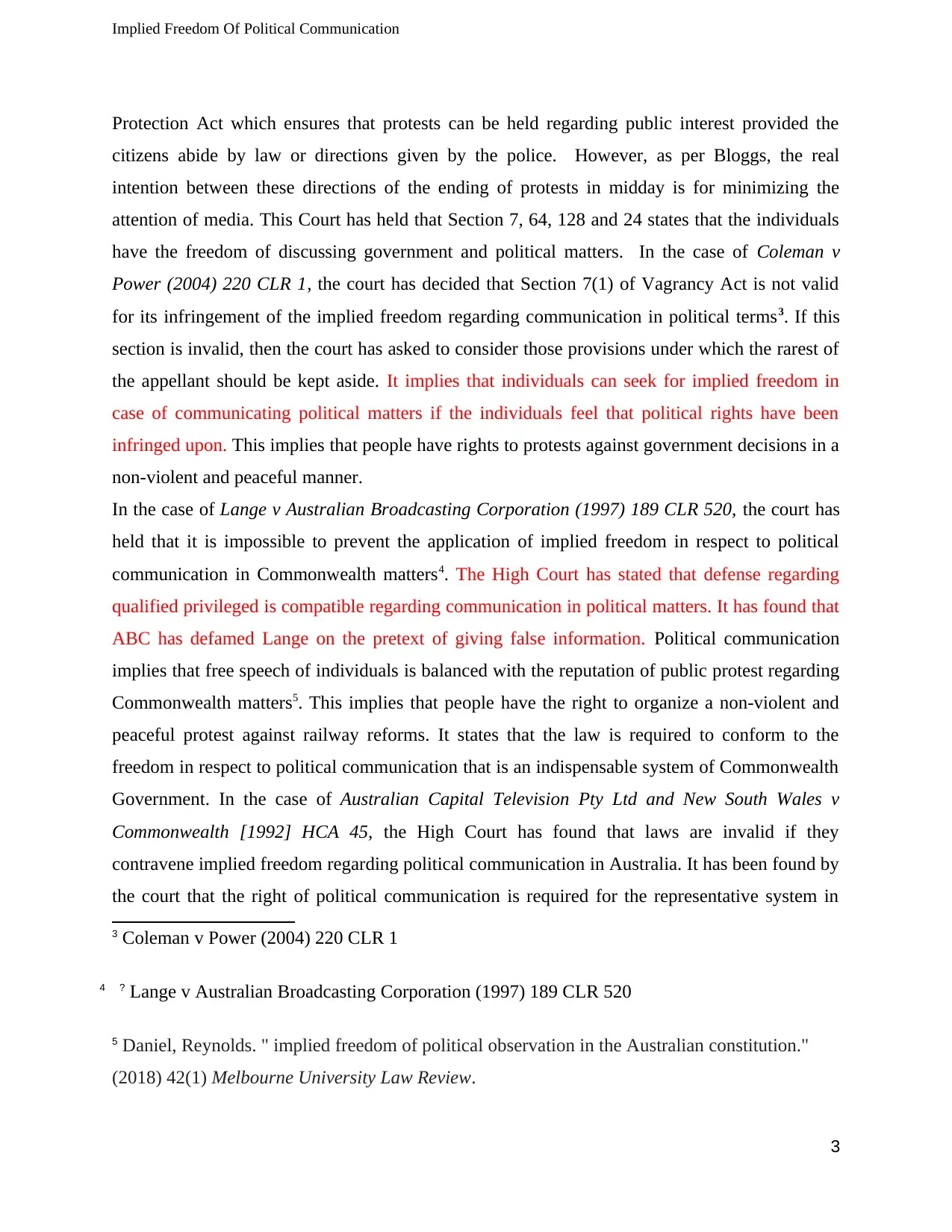
Implied Freedom Of Political Communication
Protection Act which ensures that protests can be held regarding public interest provided the
citizens abide by law or directions given by the police. However, as per Bloggs, the real
intention between these directions of the ending of protests in midday is for minimizing the
attention of media. This Court has held that Section 7, 64, 128 and 24 states that the individuals
have the freedom of discussing government and political matters. In the case of Coleman v
Power (2004) 220 CLR 1, the court has decided that Section 7(1) of Vagrancy Act is not valid
for its infringement of the implied freedom regarding communication in political terms3. If this
section is invalid, then the court has asked to consider those provisions under which the rarest of
the appellant should be kept aside. It implies that individuals can seek for implied freedom in
case of communicating political matters if the individuals feel that political rights have been
infringed upon. This implies that people have rights to protests against government decisions in a
non-violent and peaceful manner.
In the case of Lange v Australian Broadcasting Corporation (1997) 189 CLR 520, the court has
held that it is impossible to prevent the application of implied freedom in respect to political
communication in Commonwealth matters4. The High Court has stated that defense regarding
qualified privileged is compatible regarding communication in political matters. It has found that
ABC has defamed Lange on the pretext of giving false information. Political communication
implies that free speech of individuals is balanced with the reputation of public protest regarding
Commonwealth matters5. This implies that people have the right to organize a non-violent and
peaceful protest against railway reforms. It states that the law is required to conform to the
freedom in respect to political communication that is an indispensable system of Commonwealth
Government. In the case of Australian Capital Television Pty Ltd and New South Wales v
Commonwealth [1992] HCA 45, the High Court has found that laws are invalid if they
contravene implied freedom regarding political communication in Australia. It has been found by
the court that the right of political communication is required for the representative system in
3 Coleman v Power (2004) 220 CLR 1
4 ? Lange v Australian Broadcasting Corporation (1997) 189 CLR 520
5 Daniel, Reynolds. " implied freedom of political observation in the Australian constitution."
(2018) 42(1) Melbourne University Law Review.
3
Protection Act which ensures that protests can be held regarding public interest provided the
citizens abide by law or directions given by the police. However, as per Bloggs, the real
intention between these directions of the ending of protests in midday is for minimizing the
attention of media. This Court has held that Section 7, 64, 128 and 24 states that the individuals
have the freedom of discussing government and political matters. In the case of Coleman v
Power (2004) 220 CLR 1, the court has decided that Section 7(1) of Vagrancy Act is not valid
for its infringement of the implied freedom regarding communication in political terms3. If this
section is invalid, then the court has asked to consider those provisions under which the rarest of
the appellant should be kept aside. It implies that individuals can seek for implied freedom in
case of communicating political matters if the individuals feel that political rights have been
infringed upon. This implies that people have rights to protests against government decisions in a
non-violent and peaceful manner.
In the case of Lange v Australian Broadcasting Corporation (1997) 189 CLR 520, the court has
held that it is impossible to prevent the application of implied freedom in respect to political
communication in Commonwealth matters4. The High Court has stated that defense regarding
qualified privileged is compatible regarding communication in political matters. It has found that
ABC has defamed Lange on the pretext of giving false information. Political communication
implies that free speech of individuals is balanced with the reputation of public protest regarding
Commonwealth matters5. This implies that people have the right to organize a non-violent and
peaceful protest against railway reforms. It states that the law is required to conform to the
freedom in respect to political communication that is an indispensable system of Commonwealth
Government. In the case of Australian Capital Television Pty Ltd and New South Wales v
Commonwealth [1992] HCA 45, the High Court has found that laws are invalid if they
contravene implied freedom regarding political communication in Australia. It has been found by
the court that the right of political communication is required for the representative system in
3 Coleman v Power (2004) 220 CLR 1
4 ? Lange v Australian Broadcasting Corporation (1997) 189 CLR 520
5 Daniel, Reynolds. " implied freedom of political observation in the Australian constitution."
(2018) 42(1) Melbourne University Law Review.
3
Paraphrase This Document
Need a fresh take? Get an instant paraphrase of this document with our AI Paraphraser
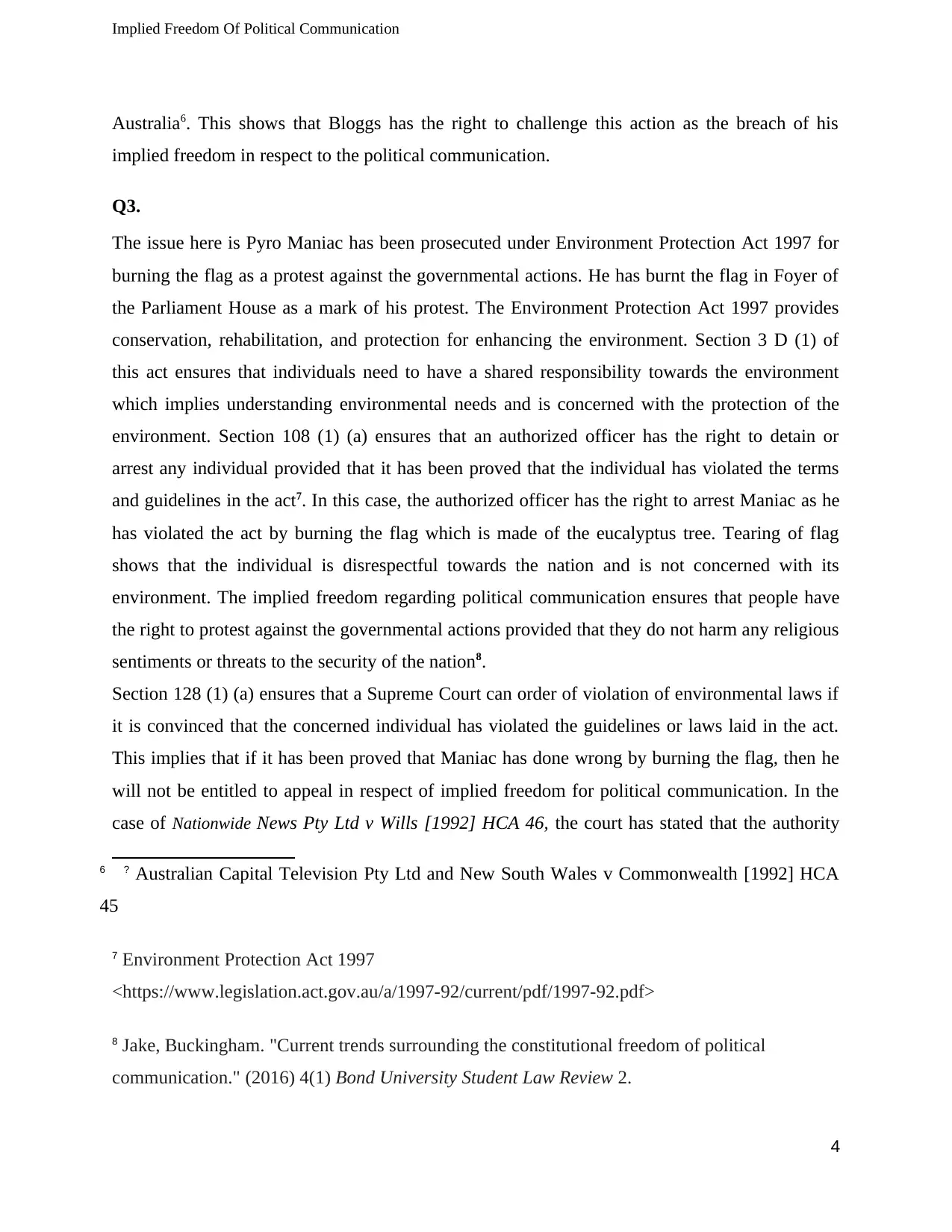
Implied Freedom Of Political Communication
Australia6. This shows that Bloggs has the right to challenge this action as the breach of his
implied freedom in respect to the political communication.
Q3.
The issue here is Pyro Maniac has been prosecuted under Environment Protection Act 1997 for
burning the flag as a protest against the governmental actions. He has burnt the flag in Foyer of
the Parliament House as a mark of his protest. The Environment Protection Act 1997 provides
conservation, rehabilitation, and protection for enhancing the environment. Section 3 D (1) of
this act ensures that individuals need to have a shared responsibility towards the environment
which implies understanding environmental needs and is concerned with the protection of the
environment. Section 108 (1) (a) ensures that an authorized officer has the right to detain or
arrest any individual provided that it has been proved that the individual has violated the terms
and guidelines in the act7. In this case, the authorized officer has the right to arrest Maniac as he
has violated the act by burning the flag which is made of the eucalyptus tree. Tearing of flag
shows that the individual is disrespectful towards the nation and is not concerned with its
environment. The implied freedom regarding political communication ensures that people have
the right to protest against the governmental actions provided that they do not harm any religious
sentiments or threats to the security of the nation8.
Section 128 (1) (a) ensures that a Supreme Court can order of violation of environmental laws if
it is convinced that the concerned individual has violated the guidelines or laws laid in the act.
This implies that if it has been proved that Maniac has done wrong by burning the flag, then he
will not be entitled to appeal in respect of implied freedom for political communication. In the
case of Nationwide News Pty Ltd v Wills [1992] HCA 46, the court has stated that the authority
6 ? Australian Capital Television Pty Ltd and New South Wales v Commonwealth [1992] HCA
45
7 Environment Protection Act 1997
<https://www.legislation.act.gov.au/a/1997-92/current/pdf/1997-92.pdf>
8 Jake, Buckingham. "Current trends surrounding the constitutional freedom of political
communication." (2016) 4(1) Bond University Student Law Review 2.
4
Australia6. This shows that Bloggs has the right to challenge this action as the breach of his
implied freedom in respect to the political communication.
Q3.
The issue here is Pyro Maniac has been prosecuted under Environment Protection Act 1997 for
burning the flag as a protest against the governmental actions. He has burnt the flag in Foyer of
the Parliament House as a mark of his protest. The Environment Protection Act 1997 provides
conservation, rehabilitation, and protection for enhancing the environment. Section 3 D (1) of
this act ensures that individuals need to have a shared responsibility towards the environment
which implies understanding environmental needs and is concerned with the protection of the
environment. Section 108 (1) (a) ensures that an authorized officer has the right to detain or
arrest any individual provided that it has been proved that the individual has violated the terms
and guidelines in the act7. In this case, the authorized officer has the right to arrest Maniac as he
has violated the act by burning the flag which is made of the eucalyptus tree. Tearing of flag
shows that the individual is disrespectful towards the nation and is not concerned with its
environment. The implied freedom regarding political communication ensures that people have
the right to protest against the governmental actions provided that they do not harm any religious
sentiments or threats to the security of the nation8.
Section 128 (1) (a) ensures that a Supreme Court can order of violation of environmental laws if
it is convinced that the concerned individual has violated the guidelines or laws laid in the act.
This implies that if it has been proved that Maniac has done wrong by burning the flag, then he
will not be entitled to appeal in respect of implied freedom for political communication. In the
case of Nationwide News Pty Ltd v Wills [1992] HCA 46, the court has stated that the authority
6 ? Australian Capital Television Pty Ltd and New South Wales v Commonwealth [1992] HCA
45
7 Environment Protection Act 1997
<https://www.legislation.act.gov.au/a/1997-92/current/pdf/1997-92.pdf>
8 Jake, Buckingham. "Current trends surrounding the constitutional freedom of political
communication." (2016) 4(1) Bond University Student Law Review 2.
4
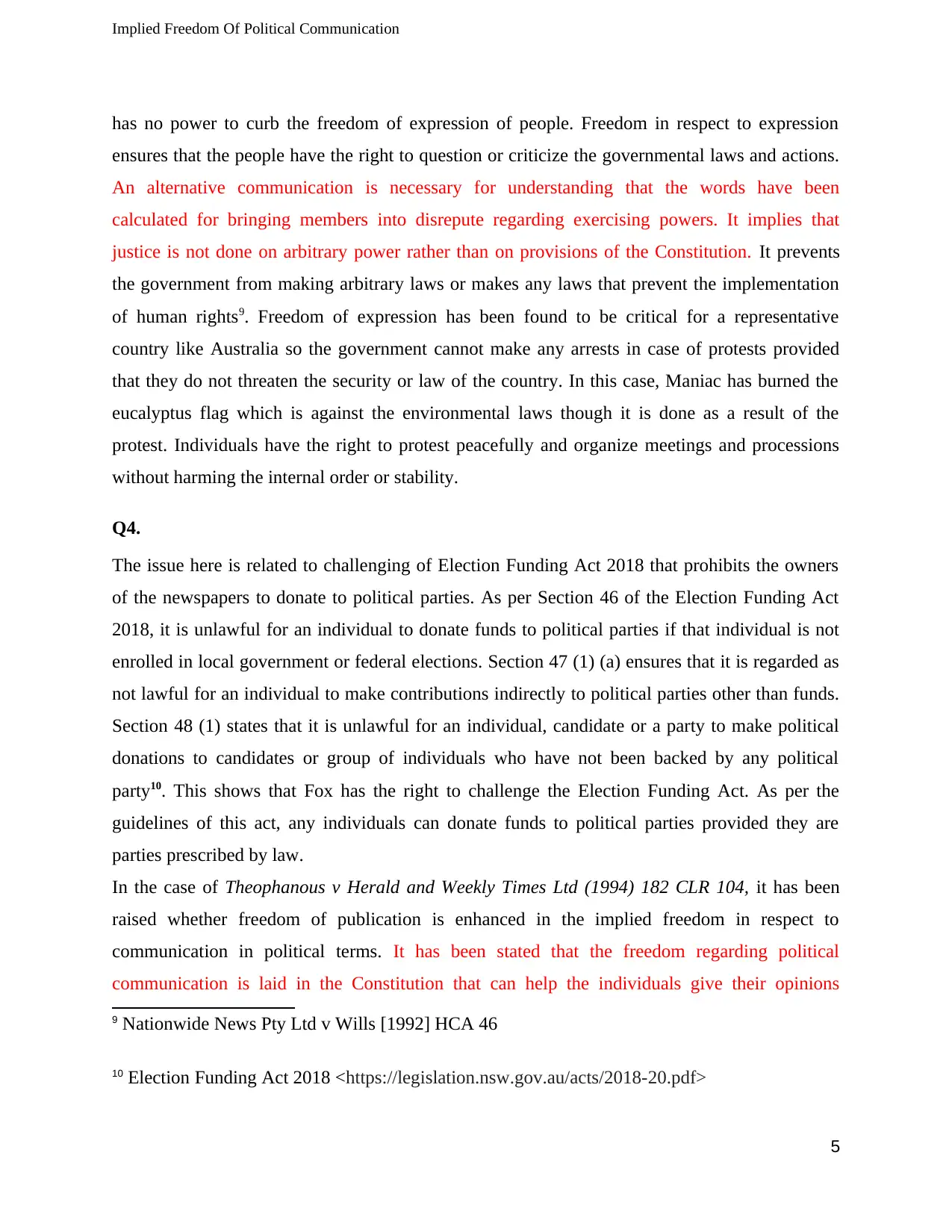
Implied Freedom Of Political Communication
has no power to curb the freedom of expression of people. Freedom in respect to expression
ensures that the people have the right to question or criticize the governmental laws and actions.
An alternative communication is necessary for understanding that the words have been
calculated for bringing members into disrepute regarding exercising powers. It implies that
justice is not done on arbitrary power rather than on provisions of the Constitution. It prevents
the government from making arbitrary laws or makes any laws that prevent the implementation
of human rights9. Freedom of expression has been found to be critical for a representative
country like Australia so the government cannot make any arrests in case of protests provided
that they do not threaten the security or law of the country. In this case, Maniac has burned the
eucalyptus flag which is against the environmental laws though it is done as a result of the
protest. Individuals have the right to protest peacefully and organize meetings and processions
without harming the internal order or stability.
Q4.
The issue here is related to challenging of Election Funding Act 2018 that prohibits the owners
of the newspapers to donate to political parties. As per Section 46 of the Election Funding Act
2018, it is unlawful for an individual to donate funds to political parties if that individual is not
enrolled in local government or federal elections. Section 47 (1) (a) ensures that it is regarded as
not lawful for an individual to make contributions indirectly to political parties other than funds.
Section 48 (1) states that it is unlawful for an individual, candidate or a party to make political
donations to candidates or group of individuals who have not been backed by any political
party10. This shows that Fox has the right to challenge the Election Funding Act. As per the
guidelines of this act, any individuals can donate funds to political parties provided they are
parties prescribed by law.
In the case of Theophanous v Herald and Weekly Times Ltd (1994) 182 CLR 104, it has been
raised whether freedom of publication is enhanced in the implied freedom in respect to
communication in political terms. It has been stated that the freedom regarding political
communication is laid in the Constitution that can help the individuals give their opinions
9 Nationwide News Pty Ltd v Wills [1992] HCA 46
10 Election Funding Act 2018 <https://legislation.nsw.gov.au/acts/2018-20.pdf>
5
has no power to curb the freedom of expression of people. Freedom in respect to expression
ensures that the people have the right to question or criticize the governmental laws and actions.
An alternative communication is necessary for understanding that the words have been
calculated for bringing members into disrepute regarding exercising powers. It implies that
justice is not done on arbitrary power rather than on provisions of the Constitution. It prevents
the government from making arbitrary laws or makes any laws that prevent the implementation
of human rights9. Freedom of expression has been found to be critical for a representative
country like Australia so the government cannot make any arrests in case of protests provided
that they do not threaten the security or law of the country. In this case, Maniac has burned the
eucalyptus flag which is against the environmental laws though it is done as a result of the
protest. Individuals have the right to protest peacefully and organize meetings and processions
without harming the internal order or stability.
Q4.
The issue here is related to challenging of Election Funding Act 2018 that prohibits the owners
of the newspapers to donate to political parties. As per Section 46 of the Election Funding Act
2018, it is unlawful for an individual to donate funds to political parties if that individual is not
enrolled in local government or federal elections. Section 47 (1) (a) ensures that it is regarded as
not lawful for an individual to make contributions indirectly to political parties other than funds.
Section 48 (1) states that it is unlawful for an individual, candidate or a party to make political
donations to candidates or group of individuals who have not been backed by any political
party10. This shows that Fox has the right to challenge the Election Funding Act. As per the
guidelines of this act, any individuals can donate funds to political parties provided they are
parties prescribed by law.
In the case of Theophanous v Herald and Weekly Times Ltd (1994) 182 CLR 104, it has been
raised whether freedom of publication is enhanced in the implied freedom in respect to
communication in political terms. It has been stated that the freedom regarding political
communication is laid in the Constitution that can help the individuals give their opinions
9 Nationwide News Pty Ltd v Wills [1992] HCA 46
10 Election Funding Act 2018 <https://legislation.nsw.gov.au/acts/2018-20.pdf>
5
⊘ This is a preview!⊘
Do you want full access?
Subscribe today to unlock all pages.

Trusted by 1+ million students worldwide
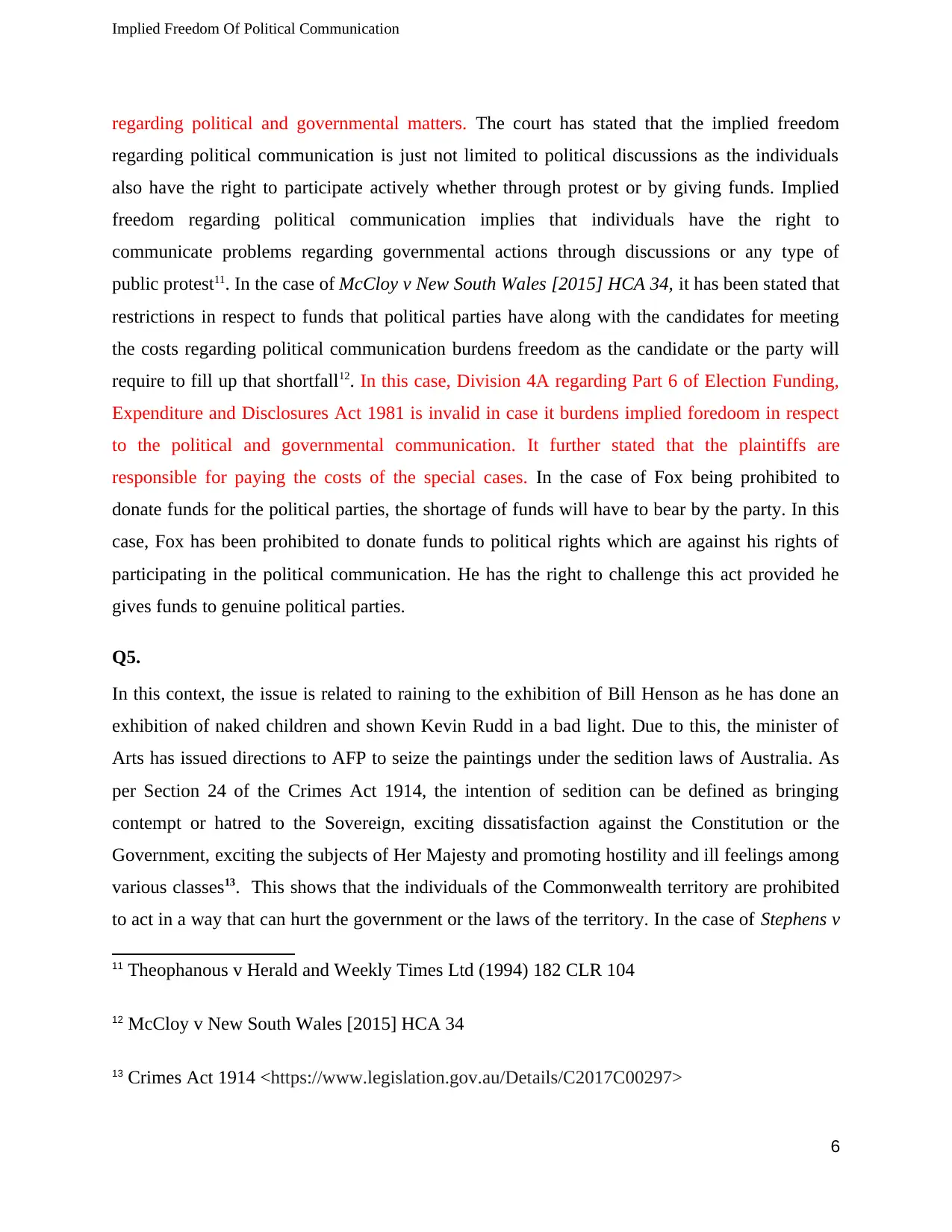
Implied Freedom Of Political Communication
regarding political and governmental matters. The court has stated that the implied freedom
regarding political communication is just not limited to political discussions as the individuals
also have the right to participate actively whether through protest or by giving funds. Implied
freedom regarding political communication implies that individuals have the right to
communicate problems regarding governmental actions through discussions or any type of
public protest11. In the case of McCloy v New South Wales [2015] HCA 34, it has been stated that
restrictions in respect to funds that political parties have along with the candidates for meeting
the costs regarding political communication burdens freedom as the candidate or the party will
require to fill up that shortfall12. In this case, Division 4A regarding Part 6 of Election Funding,
Expenditure and Disclosures Act 1981 is invalid in case it burdens implied foredoom in respect
to the political and governmental communication. It further stated that the plaintiffs are
responsible for paying the costs of the special cases. In the case of Fox being prohibited to
donate funds for the political parties, the shortage of funds will have to bear by the party. In this
case, Fox has been prohibited to donate funds to political rights which are against his rights of
participating in the political communication. He has the right to challenge this act provided he
gives funds to genuine political parties.
Q5.
In this context, the issue is related to raining to the exhibition of Bill Henson as he has done an
exhibition of naked children and shown Kevin Rudd in a bad light. Due to this, the minister of
Arts has issued directions to AFP to seize the paintings under the sedition laws of Australia. As
per Section 24 of the Crimes Act 1914, the intention of sedition can be defined as bringing
contempt or hatred to the Sovereign, exciting dissatisfaction against the Constitution or the
Government, exciting the subjects of Her Majesty and promoting hostility and ill feelings among
various classes13. This shows that the individuals of the Commonwealth territory are prohibited
to act in a way that can hurt the government or the laws of the territory. In the case of Stephens v
11 Theophanous v Herald and Weekly Times Ltd (1994) 182 CLR 104
12 McCloy v New South Wales [2015] HCA 34
13 Crimes Act 1914 <https://www.legislation.gov.au/Details/C2017C00297>
6
regarding political and governmental matters. The court has stated that the implied freedom
regarding political communication is just not limited to political discussions as the individuals
also have the right to participate actively whether through protest or by giving funds. Implied
freedom regarding political communication implies that individuals have the right to
communicate problems regarding governmental actions through discussions or any type of
public protest11. In the case of McCloy v New South Wales [2015] HCA 34, it has been stated that
restrictions in respect to funds that political parties have along with the candidates for meeting
the costs regarding political communication burdens freedom as the candidate or the party will
require to fill up that shortfall12. In this case, Division 4A regarding Part 6 of Election Funding,
Expenditure and Disclosures Act 1981 is invalid in case it burdens implied foredoom in respect
to the political and governmental communication. It further stated that the plaintiffs are
responsible for paying the costs of the special cases. In the case of Fox being prohibited to
donate funds for the political parties, the shortage of funds will have to bear by the party. In this
case, Fox has been prohibited to donate funds to political rights which are against his rights of
participating in the political communication. He has the right to challenge this act provided he
gives funds to genuine political parties.
Q5.
In this context, the issue is related to raining to the exhibition of Bill Henson as he has done an
exhibition of naked children and shown Kevin Rudd in a bad light. Due to this, the minister of
Arts has issued directions to AFP to seize the paintings under the sedition laws of Australia. As
per Section 24 of the Crimes Act 1914, the intention of sedition can be defined as bringing
contempt or hatred to the Sovereign, exciting dissatisfaction against the Constitution or the
Government, exciting the subjects of Her Majesty and promoting hostility and ill feelings among
various classes13. This shows that the individuals of the Commonwealth territory are prohibited
to act in a way that can hurt the government or the laws of the territory. In the case of Stephens v
11 Theophanous v Herald and Weekly Times Ltd (1994) 182 CLR 104
12 McCloy v New South Wales [2015] HCA 34
13 Crimes Act 1914 <https://www.legislation.gov.au/Details/C2017C00297>
6
Paraphrase This Document
Need a fresh take? Get an instant paraphrase of this document with our AI Paraphraser
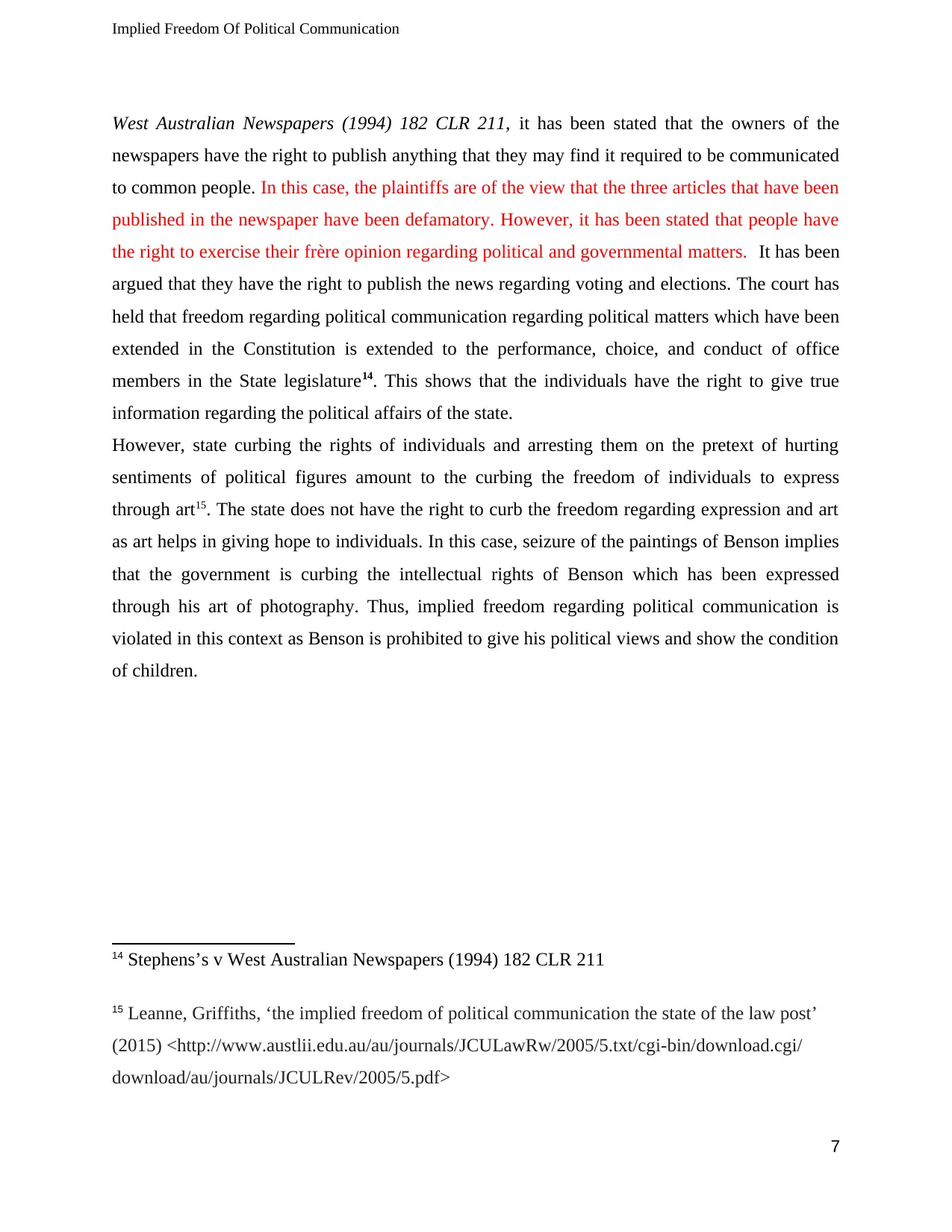
Implied Freedom Of Political Communication
West Australian Newspapers (1994) 182 CLR 211, it has been stated that the owners of the
newspapers have the right to publish anything that they may find it required to be communicated
to common people. In this case, the plaintiffs are of the view that the three articles that have been
published in the newspaper have been defamatory. However, it has been stated that people have
the right to exercise their frère opinion regarding political and governmental matters. It has been
argued that they have the right to publish the news regarding voting and elections. The court has
held that freedom regarding political communication regarding political matters which have been
extended in the Constitution is extended to the performance, choice, and conduct of office
members in the State legislature14. This shows that the individuals have the right to give true
information regarding the political affairs of the state.
However, state curbing the rights of individuals and arresting them on the pretext of hurting
sentiments of political figures amount to the curbing the freedom of individuals to express
through art15. The state does not have the right to curb the freedom regarding expression and art
as art helps in giving hope to individuals. In this case, seizure of the paintings of Benson implies
that the government is curbing the intellectual rights of Benson which has been expressed
through his art of photography. Thus, implied freedom regarding political communication is
violated in this context as Benson is prohibited to give his political views and show the condition
of children.
14 Stephens’s v West Australian Newspapers (1994) 182 CLR 211
15 Leanne, Griffiths, ‘the implied freedom of political communication the state of the law post’
(2015) <http://www.austlii.edu.au/au/journals/JCULawRw/2005/5.txt/cgi-bin/download.cgi/
download/au/journals/JCULRev/2005/5.pdf>
7
West Australian Newspapers (1994) 182 CLR 211, it has been stated that the owners of the
newspapers have the right to publish anything that they may find it required to be communicated
to common people. In this case, the plaintiffs are of the view that the three articles that have been
published in the newspaper have been defamatory. However, it has been stated that people have
the right to exercise their frère opinion regarding political and governmental matters. It has been
argued that they have the right to publish the news regarding voting and elections. The court has
held that freedom regarding political communication regarding political matters which have been
extended in the Constitution is extended to the performance, choice, and conduct of office
members in the State legislature14. This shows that the individuals have the right to give true
information regarding the political affairs of the state.
However, state curbing the rights of individuals and arresting them on the pretext of hurting
sentiments of political figures amount to the curbing the freedom of individuals to express
through art15. The state does not have the right to curb the freedom regarding expression and art
as art helps in giving hope to individuals. In this case, seizure of the paintings of Benson implies
that the government is curbing the intellectual rights of Benson which has been expressed
through his art of photography. Thus, implied freedom regarding political communication is
violated in this context as Benson is prohibited to give his political views and show the condition
of children.
14 Stephens’s v West Australian Newspapers (1994) 182 CLR 211
15 Leanne, Griffiths, ‘the implied freedom of political communication the state of the law post’
(2015) <http://www.austlii.edu.au/au/journals/JCULawRw/2005/5.txt/cgi-bin/download.cgi/
download/au/journals/JCULRev/2005/5.pdf>
7
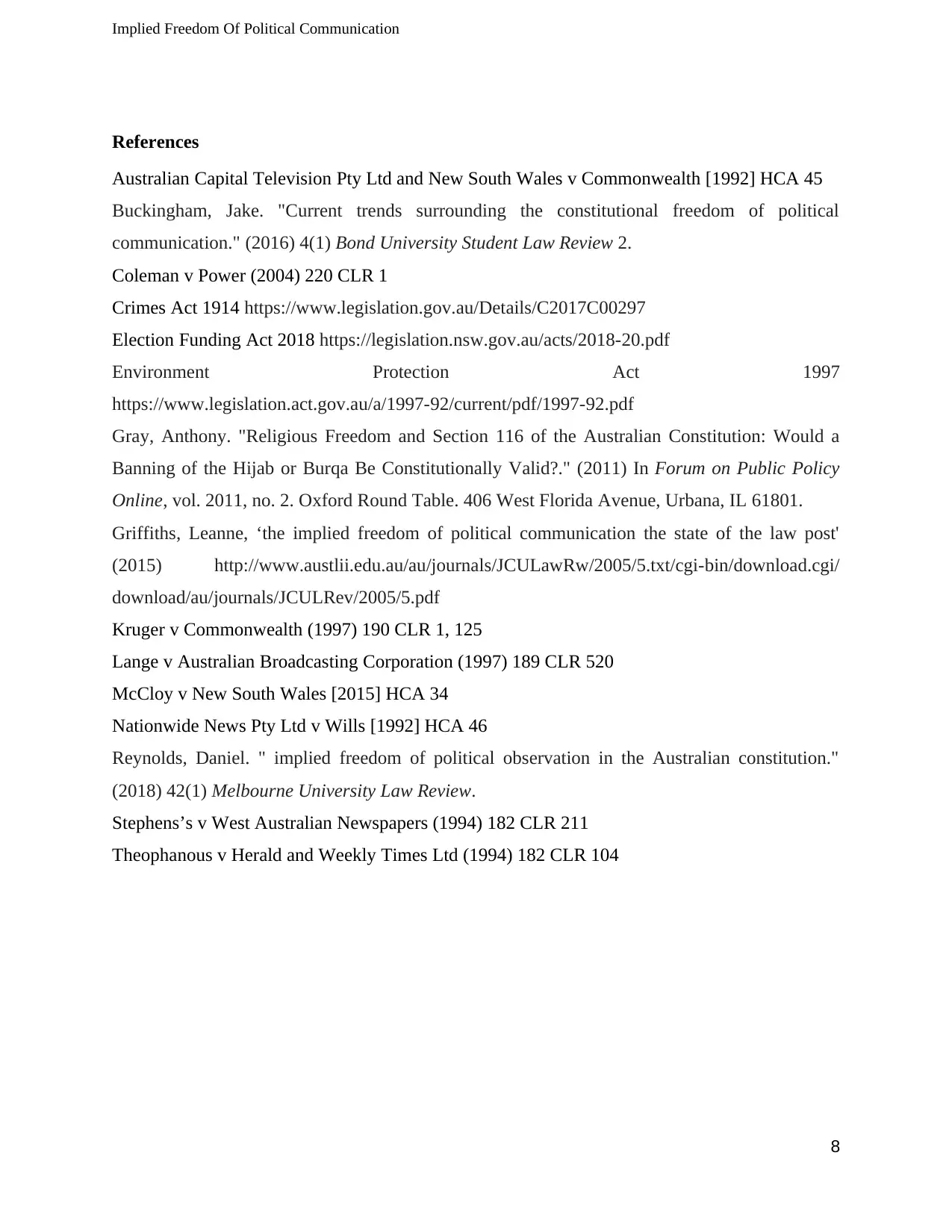
Implied Freedom Of Political Communication
References
Australian Capital Television Pty Ltd and New South Wales v Commonwealth [1992] HCA 45
Buckingham, Jake. "Current trends surrounding the constitutional freedom of political
communication." (2016) 4(1) Bond University Student Law Review 2.
Coleman v Power (2004) 220 CLR 1
Crimes Act 1914 https://www.legislation.gov.au/Details/C2017C00297
Election Funding Act 2018 https://legislation.nsw.gov.au/acts/2018-20.pdf
Environment Protection Act 1997
https://www.legislation.act.gov.au/a/1997-92/current/pdf/1997-92.pdf
Gray, Anthony. "Religious Freedom and Section 116 of the Australian Constitution: Would a
Banning of the Hijab or Burqa Be Constitutionally Valid?." (2011) In Forum on Public Policy
Online, vol. 2011, no. 2. Oxford Round Table. 406 West Florida Avenue, Urbana, IL 61801.
Griffiths, Leanne, ‘the implied freedom of political communication the state of the law post'
(2015) http://www.austlii.edu.au/au/journals/JCULawRw/2005/5.txt/cgi-bin/download.cgi/
download/au/journals/JCULRev/2005/5.pdf
Kruger v Commonwealth (1997) 190 CLR 1, 125
Lange v Australian Broadcasting Corporation (1997) 189 CLR 520
McCloy v New South Wales [2015] HCA 34
Nationwide News Pty Ltd v Wills [1992] HCA 46
Reynolds, Daniel. " implied freedom of political observation in the Australian constitution."
(2018) 42(1) Melbourne University Law Review.
Stephens’s v West Australian Newspapers (1994) 182 CLR 211
Theophanous v Herald and Weekly Times Ltd (1994) 182 CLR 104
8
References
Australian Capital Television Pty Ltd and New South Wales v Commonwealth [1992] HCA 45
Buckingham, Jake. "Current trends surrounding the constitutional freedom of political
communication." (2016) 4(1) Bond University Student Law Review 2.
Coleman v Power (2004) 220 CLR 1
Crimes Act 1914 https://www.legislation.gov.au/Details/C2017C00297
Election Funding Act 2018 https://legislation.nsw.gov.au/acts/2018-20.pdf
Environment Protection Act 1997
https://www.legislation.act.gov.au/a/1997-92/current/pdf/1997-92.pdf
Gray, Anthony. "Religious Freedom and Section 116 of the Australian Constitution: Would a
Banning of the Hijab or Burqa Be Constitutionally Valid?." (2011) In Forum on Public Policy
Online, vol. 2011, no. 2. Oxford Round Table. 406 West Florida Avenue, Urbana, IL 61801.
Griffiths, Leanne, ‘the implied freedom of political communication the state of the law post'
(2015) http://www.austlii.edu.au/au/journals/JCULawRw/2005/5.txt/cgi-bin/download.cgi/
download/au/journals/JCULRev/2005/5.pdf
Kruger v Commonwealth (1997) 190 CLR 1, 125
Lange v Australian Broadcasting Corporation (1997) 189 CLR 520
McCloy v New South Wales [2015] HCA 34
Nationwide News Pty Ltd v Wills [1992] HCA 46
Reynolds, Daniel. " implied freedom of political observation in the Australian constitution."
(2018) 42(1) Melbourne University Law Review.
Stephens’s v West Australian Newspapers (1994) 182 CLR 211
Theophanous v Herald and Weekly Times Ltd (1994) 182 CLR 104
8
⊘ This is a preview!⊘
Do you want full access?
Subscribe today to unlock all pages.

Trusted by 1+ million students worldwide
1 out of 9
Related Documents
Your All-in-One AI-Powered Toolkit for Academic Success.
+13062052269
info@desklib.com
Available 24*7 on WhatsApp / Email
![[object Object]](/_next/static/media/star-bottom.7253800d.svg)
Unlock your academic potential
Copyright © 2020–2025 A2Z Services. All Rights Reserved. Developed and managed by ZUCOL.




